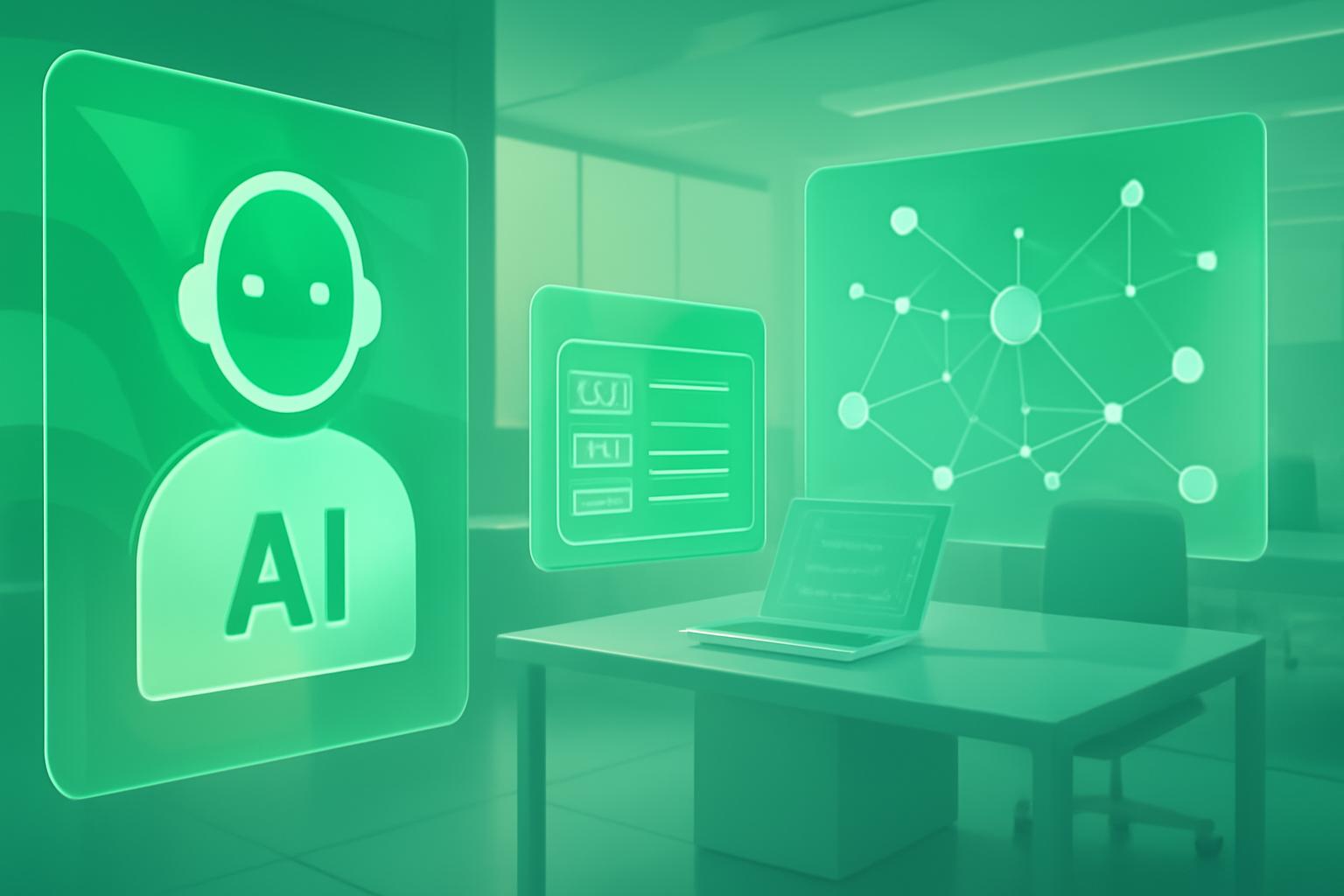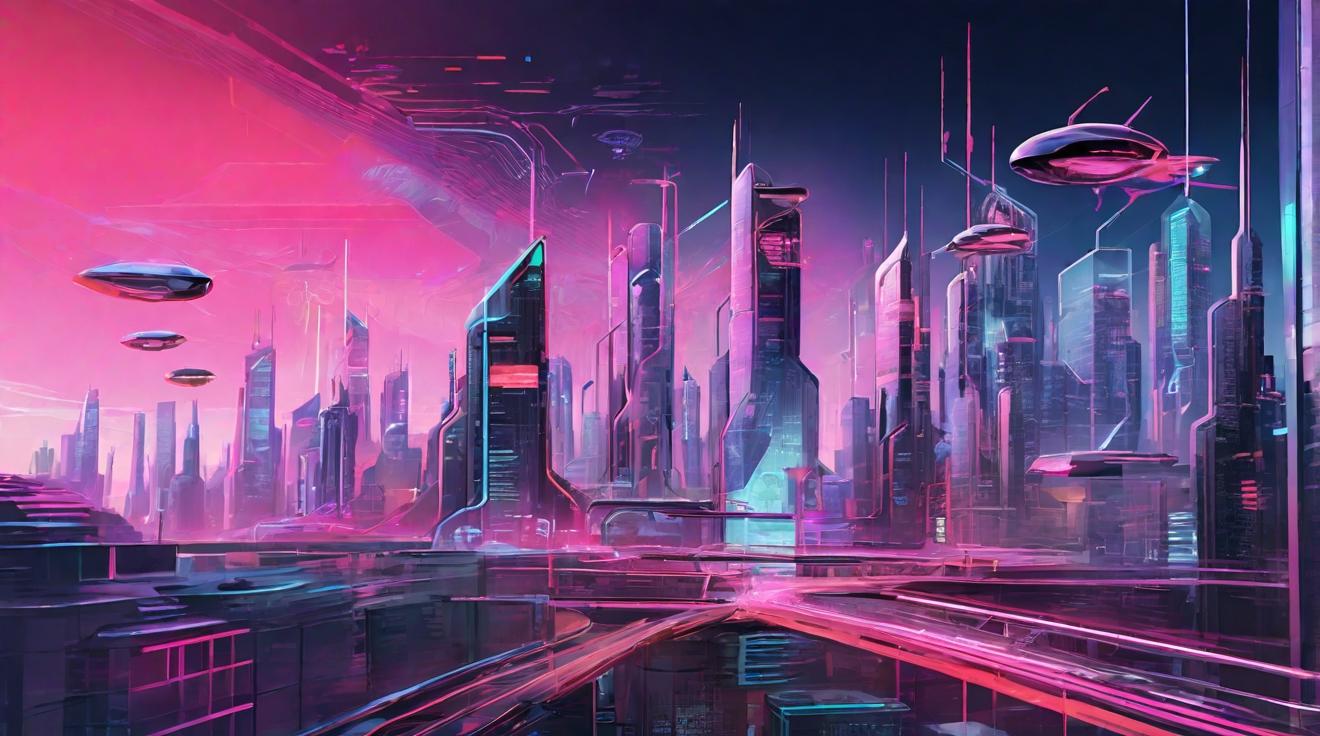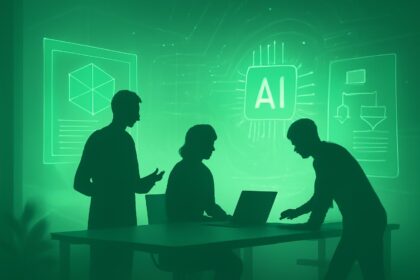To demonstrate AgentKit’s ease of use, OpenAI engineer Christina Huang built two AI agents and a complete AI workflow live onstage in under eight minutes. !-- wp:paragraph -->
“This is all the stuff that we wished we had when we were trying to build our first agents,” Altman remarked, highlighting the toolkit’s developer-centric design. OpenAI has already onboarded several launch partners who have scaled AI agents using AgentKit.FinOracleAI — Market View
OpenAI’s AgentKit launch marks a pivotal advancement in democratizing AI agent development and deployment. By lowering barriers and providing integrated tools, OpenAI strengthens its leadership position in the autonomous AI agent market, which is becoming increasingly competitive as enterprises demand sophisticated AI solutions. !-- wp:paragraph -->- Opportunities: Accelerated adoption of AI agents across industries, streamlined developer workflows, enhanced integration capabilities, and potential expansion of AI-driven automation in enterprises.
- Risks: Intense competition from other AI platform providers, challenges in ensuring security and privacy with agent integrations, and the need for continuous improvement to meet evolving enterprise requirements.
Impact: AgentKit is poised to drive significant growth in AI agent deployment by simplifying development and integration, reinforcing OpenAI’s competitive edge in the expanding autonomous AI ecosystem.
The introduction of AgentKit signals OpenAI’s intensified focus on expanding developer adoption by simplifying the creation of autonomous AI agents. This move positions OpenAI competitively against other AI platforms that are rapidly developing integrated solutions for enterprise-grade autonomous agents capable of performing complex tasks beyond simple prompt responses. !-- wp:paragraph --> AgentKit was among several major announcements at Dev Day, including the new capability for developers to build applications directly within ChatGPT, which currently supports 800 million weekly active users. !-- wp:paragraph -->Core Components of AgentKit
- Agent Builder: Described by Altman as “like Canva for building agents,” this tool offers a fast, visual interface to design agent logic and workflows, building on the widely used responses API.
- ChatKit: Provides a simple, embeddable chat interface that developers can customize to integrate chat experiences into their own applications, preserving brand identity and unique workflows.
- Evals for Agents: Tools to evaluate AI agent performance, including step-by-step trace grading, datasets for component-level assessment, automated prompt optimization, and the ability to run evaluations on external models directly via OpenAI’s platform.
- Connector Registry: Enables secure connections between agents and internal or third-party tools through an administrative control panel, ensuring security and operational control.
“This is all the stuff that we wished we had when we were trying to build our first agents,” Altman remarked, highlighting the toolkit’s developer-centric design. OpenAI has already onboarded several launch partners who have scaled AI agents using AgentKit.FinOracleAI — Market View
OpenAI’s AgentKit launch marks a pivotal advancement in democratizing AI agent development and deployment. By lowering barriers and providing integrated tools, OpenAI strengthens its leadership position in the autonomous AI agent market, which is becoming increasingly competitive as enterprises demand sophisticated AI solutions. !-- wp:paragraph -->- Opportunities: Accelerated adoption of AI agents across industries, streamlined developer workflows, enhanced integration capabilities, and potential expansion of AI-driven automation in enterprises.
- Risks: Intense competition from other AI platform providers, challenges in ensuring security and privacy with agent integrations, and the need for continuous improvement to meet evolving enterprise requirements.
Impact: AgentKit is poised to drive significant growth in AI agent deployment by simplifying development and integration, reinforcing OpenAI’s competitive edge in the expanding autonomous AI ecosystem.
The introduction of AgentKit signals OpenAI’s intensified focus on expanding developer adoption by simplifying the creation of autonomous AI agents. This move positions OpenAI competitively against other AI platforms that are rapidly developing integrated solutions for enterprise-grade autonomous agents capable of performing complex tasks beyond simple prompt responses. !-- wp:paragraph --> AgentKit was among several major announcements at Dev Day, including the new capability for developers to build applications directly within ChatGPT, which currently supports 800 million weekly active users. !-- wp:paragraph -->Core Components of AgentKit
- Agent Builder: Described by Altman as “like Canva for building agents,” this tool offers a fast, visual interface to design agent logic and workflows, building on the widely used responses API.
- ChatKit: Provides a simple, embeddable chat interface that developers can customize to integrate chat experiences into their own applications, preserving brand identity and unique workflows.
- Evals for Agents: Tools to evaluate AI agent performance, including step-by-step trace grading, datasets for component-level assessment, automated prompt optimization, and the ability to run evaluations on external models directly via OpenAI’s platform.
- Connector Registry: Enables secure connections between agents and internal or third-party tools through an administrative control panel, ensuring security and operational control.
“This is all the stuff that we wished we had when we were trying to build our first agents,” Altman remarked, highlighting the toolkit’s developer-centric design. OpenAI has already onboarded several launch partners who have scaled AI agents using AgentKit.FinOracleAI — Market View
OpenAI’s AgentKit launch marks a pivotal advancement in democratizing AI agent development and deployment. By lowering barriers and providing integrated tools, OpenAI strengthens its leadership position in the autonomous AI agent market, which is becoming increasingly competitive as enterprises demand sophisticated AI solutions. !-- wp:paragraph -->- Opportunities: Accelerated adoption of AI agents across industries, streamlined developer workflows, enhanced integration capabilities, and potential expansion of AI-driven automation in enterprises.
- Risks: Intense competition from other AI platform providers, challenges in ensuring security and privacy with agent integrations, and the need for continuous improvement to meet evolving enterprise requirements.
Impact: AgentKit is poised to drive significant growth in AI agent deployment by simplifying development and integration, reinforcing OpenAI’s competitive edge in the expanding autonomous AI ecosystem.
OpenAI CEO Sam Altman announced the release of AgentKit on Monday during the company’s Dev Day event. AgentKit is a comprehensive toolkit designed to enable developers to build, deploy, and optimize AI agents with significantly reduced complexity and faster turnaround. !-- wp:paragraph --> “AgentKit is a complete set of building blocks available in the OpenAI platform designed to help you take agents from prototype to production,” Altman explained. “It is everything you need to build, deploy, and optimize agent workflows with way less friction.” !-- wp:paragraph -->Strategic Move to Boost Developer Adoption and Enterprise AI
The introduction of AgentKit signals OpenAI’s intensified focus on expanding developer adoption by simplifying the creation of autonomous AI agents. This move positions OpenAI competitively against other AI platforms that are rapidly developing integrated solutions for enterprise-grade autonomous agents capable of performing complex tasks beyond simple prompt responses. !-- wp:paragraph --> AgentKit was among several major announcements at Dev Day, including the new capability for developers to build applications directly within ChatGPT, which currently supports 800 million weekly active users. !-- wp:paragraph -->Core Components of AgentKit
- Agent Builder: Described by Altman as “like Canva for building agents,” this tool offers a fast, visual interface to design agent logic and workflows, building on the widely used responses API.
- ChatKit: Provides a simple, embeddable chat interface that developers can customize to integrate chat experiences into their own applications, preserving brand identity and unique workflows.
- Evals for Agents: Tools to evaluate AI agent performance, including step-by-step trace grading, datasets for component-level assessment, automated prompt optimization, and the ability to run evaluations on external models directly via OpenAI’s platform.
- Connector Registry: Enables secure connections between agents and internal or third-party tools through an administrative control panel, ensuring security and operational control.
“This is all the stuff that we wished we had when we were trying to build our first agents,” Altman remarked, highlighting the toolkit’s developer-centric design. OpenAI has already onboarded several launch partners who have scaled AI agents using AgentKit.FinOracleAI — Market View
OpenAI’s AgentKit launch marks a pivotal advancement in democratizing AI agent development and deployment. By lowering barriers and providing integrated tools, OpenAI strengthens its leadership position in the autonomous AI agent market, which is becoming increasingly competitive as enterprises demand sophisticated AI solutions. !-- wp:paragraph -->- Opportunities: Accelerated adoption of AI agents across industries, streamlined developer workflows, enhanced integration capabilities, and potential expansion of AI-driven automation in enterprises.
- Risks: Intense competition from other AI platform providers, challenges in ensuring security and privacy with agent integrations, and the need for continuous improvement to meet evolving enterprise requirements.
Impact: AgentKit is poised to drive significant growth in AI agent deployment by simplifying development and integration, reinforcing OpenAI’s competitive edge in the expanding autonomous AI ecosystem.
OpenAI CEO Sam Altman announced the release of AgentKit on Monday during the company’s Dev Day event. AgentKit is a comprehensive toolkit designed to enable developers to build, deploy, and optimize AI agents with significantly reduced complexity and faster turnaround. !-- wp:paragraph --> “AgentKit is a complete set of building blocks available in the OpenAI platform designed to help you take agents from prototype to production,” Altman explained. “It is everything you need to build, deploy, and optimize agent workflows with way less friction.” !-- wp:paragraph -->Strategic Move to Boost Developer Adoption and Enterprise AI
The introduction of AgentKit signals OpenAI’s intensified focus on expanding developer adoption by simplifying the creation of autonomous AI agents. This move positions OpenAI competitively against other AI platforms that are rapidly developing integrated solutions for enterprise-grade autonomous agents capable of performing complex tasks beyond simple prompt responses. !-- wp:paragraph --> AgentKit was among several major announcements at Dev Day, including the new capability for developers to build applications directly within ChatGPT, which currently supports 800 million weekly active users. !-- wp:paragraph -->Core Components of AgentKit
- Agent Builder: Described by Altman as “like Canva for building agents,” this tool offers a fast, visual interface to design agent logic and workflows, building on the widely used responses API.
- ChatKit: Provides a simple, embeddable chat interface that developers can customize to integrate chat experiences into their own applications, preserving brand identity and unique workflows.
- Evals for Agents: Tools to evaluate AI agent performance, including step-by-step trace grading, datasets for component-level assessment, automated prompt optimization, and the ability to run evaluations on external models directly via OpenAI’s platform.
- Connector Registry: Enables secure connections between agents and internal or third-party tools through an administrative control panel, ensuring security and operational control.
“This is all the stuff that we wished we had when we were trying to build our first agents,” Altman remarked, highlighting the toolkit’s developer-centric design. OpenAI has already onboarded several launch partners who have scaled AI agents using AgentKit.FinOracleAI — Market View
OpenAI’s AgentKit launch marks a pivotal advancement in democratizing AI agent development and deployment. By lowering barriers and providing integrated tools, OpenAI strengthens its leadership position in the autonomous AI agent market, which is becoming increasingly competitive as enterprises demand sophisticated AI solutions. !-- wp:paragraph -->- Opportunities: Accelerated adoption of AI agents across industries, streamlined developer workflows, enhanced integration capabilities, and potential expansion of AI-driven automation in enterprises.
- Risks: Intense competition from other AI platform providers, challenges in ensuring security and privacy with agent integrations, and the need for continuous improvement to meet evolving enterprise requirements.
Impact: AgentKit is poised to drive significant growth in AI agent deployment by simplifying development and integration, reinforcing OpenAI’s competitive edge in the expanding autonomous AI ecosystem.
OpenAI Launches AgentKit to Accelerate AI Agent Development
OpenAI CEO Sam Altman announced the release of AgentKit on Monday during the company’s Dev Day event. AgentKit is a comprehensive toolkit designed to enable developers to build, deploy, and optimize AI agents with significantly reduced complexity and faster turnaround. !-- wp:paragraph --> “AgentKit is a complete set of building blocks available in the OpenAI platform designed to help you take agents from prototype to production,” Altman explained. “It is everything you need to build, deploy, and optimize agent workflows with way less friction.” !-- wp:paragraph -->Strategic Move to Boost Developer Adoption and Enterprise AI
The introduction of AgentKit signals OpenAI’s intensified focus on expanding developer adoption by simplifying the creation of autonomous AI agents. This move positions OpenAI competitively against other AI platforms that are rapidly developing integrated solutions for enterprise-grade autonomous agents capable of performing complex tasks beyond simple prompt responses. !-- wp:paragraph --> AgentKit was among several major announcements at Dev Day, including the new capability for developers to build applications directly within ChatGPT, which currently supports 800 million weekly active users. !-- wp:paragraph -->Core Components of AgentKit
- Agent Builder: Described by Altman as “like Canva for building agents,” this tool offers a fast, visual interface to design agent logic and workflows, building on the widely used responses API.
- ChatKit: Provides a simple, embeddable chat interface that developers can customize to integrate chat experiences into their own applications, preserving brand identity and unique workflows.
- Evals for Agents: Tools to evaluate AI agent performance, including step-by-step trace grading, datasets for component-level assessment, automated prompt optimization, and the ability to run evaluations on external models directly via OpenAI’s platform.
- Connector Registry: Enables secure connections between agents and internal or third-party tools through an administrative control panel, ensuring security and operational control.
“This is all the stuff that we wished we had when we were trying to build our first agents,” Altman remarked, highlighting the toolkit’s developer-centric design. OpenAI has already onboarded several launch partners who have scaled AI agents using AgentKit.FinOracleAI — Market View
OpenAI’s AgentKit launch marks a pivotal advancement in democratizing AI agent development and deployment. By lowering barriers and providing integrated tools, OpenAI strengthens its leadership position in the autonomous AI agent market, which is becoming increasingly competitive as enterprises demand sophisticated AI solutions. !-- wp:paragraph -->- Opportunities: Accelerated adoption of AI agents across industries, streamlined developer workflows, enhanced integration capabilities, and potential expansion of AI-driven automation in enterprises.
- Risks: Intense competition from other AI platform providers, challenges in ensuring security and privacy with agent integrations, and the need for continuous improvement to meet evolving enterprise requirements.
Impact: AgentKit is poised to drive significant growth in AI agent deployment by simplifying development and integration, reinforcing OpenAI’s competitive edge in the expanding autonomous AI ecosystem.













